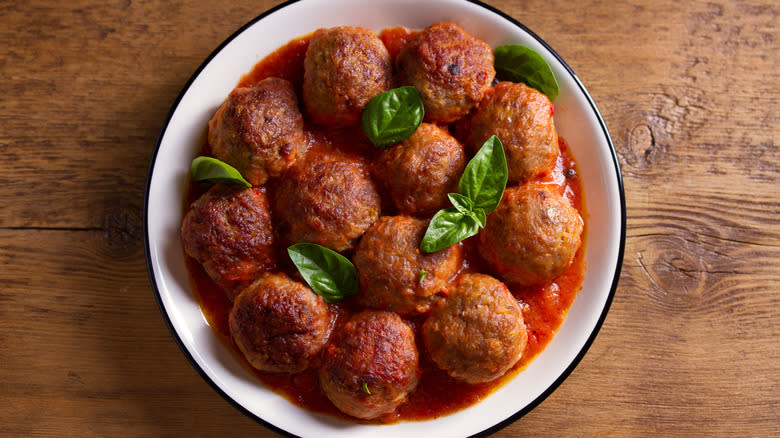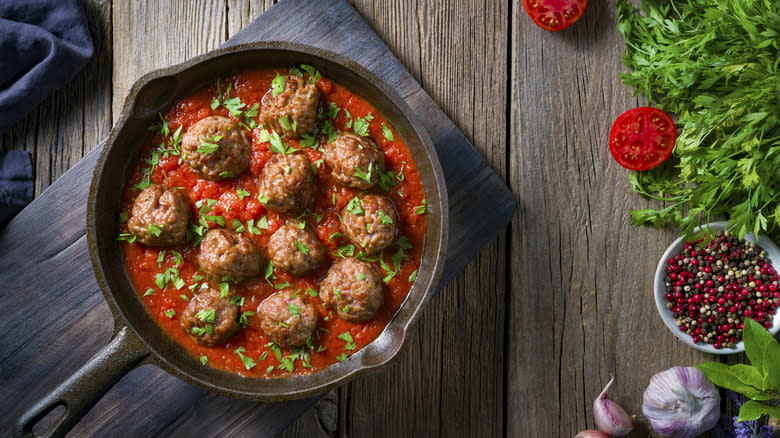The Chef-Approved Secret Ingredient For Incredibly Flavorful Meatballs

Meatballs in tomato sauce are a versatile comfort food, perfect paired with anything from pasta to polenta to a hearty sesame seed roll. They're sold prepared in specialty food shops or in the frozen food section of the supermarket, but if you have a little extra time, it's worth it to make your own. You can customize practically any meatball recipe with any meat and ingredients you'd like, and they'll often come out much better than the store-bought kind. If you're looking for the key to unlock extra flavorful meatballs, the secret ingredient favored by some chefs is none other than tomato sauce.
Of course, simmering meatballs in tomato sauce is a common way to infuse flavor, but adding a little right into the mix will help give them an extra burst of acidity and keep them moist. This is true no matter what kind of meat you use, whether you opt for poultry or a mix of beef, pork, and veal.
Read more: 15 Tips For Making The Best Meatloaf
Tomato Sauce Tenderizes Your Meatball Mixture

Next time you're prepping a batch of meatballs, a little tomato sauce might be just the trick. Tomatoes lend an umami richness to the mixture while also making it a little silkier. You don't want it to be soupy by any means, so add only a small amount at first (a tablespoon is a good place to start). For best results and smoothest incorporation, you'll want to make sure the sauce is room temperature or colder. Mixing the meat with tomato sauce will also save your meatballs from becoming chewy. This is because the acid in tomatoes helps to break down the collagen in the meat, softening it. The idea is to end up with tenderer meatballs that meld seamlessly with the sauce.
You can certainly use a good-quality sauce from the store, but making basic tomato sauce is easy and requires just a few ingredients. Crushed plum tomatoes are the perfect base because of their relative lack of seeds. They're cooked with olive oil, onions, garlic, and other seasonings. If you prefer a sweeter sauce, don't be afraid to mix in a modest pinch of sugar. While the simplest tomato sauces can take as little as 20 minutes to come together, letting your pot simmer for a few hours can help those flavors marry together even better. Sauce also freezes easily, so if there's any leftover from making tomato-infused meatballs, it can be frozen and defrosted at a later date.
More Tips For Making Tomatoey Meatball Magic

Before choosing other add-ins, consider the type of meat you want to use. Many chefs and home cooks alike enjoy ground beef blends with higher fat content (either 80% or 85% lean) for added flavor -- when added directly to the mixture, tomatoes are a great counterpoint to the richer beef and keep the meatballs from being overly oily.
As far as what to add to your meatballs for flavor, consider what pairs well with tomato sauce. Breadcrumbs, for example, are going to help absorb the moisture and help the balls hold their shape; you pretty much need them. But rather than using the plain kind, try Italian-style pre-seasoned breadcrumbs (or season them yourself with ingredients like garlic powder, onion powder, and fresh parsley). Italian-style breadcrumbs are enhanced with things like garlic and parsley, which are often found in tomato sauce.
Adding Parmesan cheese or Pecorino is another great flavor hack for meatballs -- especially ones made from leaner meats like turkey or chicken. Not only will the cheese add heft and richness, but its sharpness will be heightened by the acidity of the tomatoes in the mixture.
Since the sauce will soften the meatball's texture, you can add a nice textural contrast with chopped ingredients, such as plenty of herbs, diced onions, and minced garlic. And don't forget to season the meat generously with salt when browning.
Read the original article on Daily Meal.

